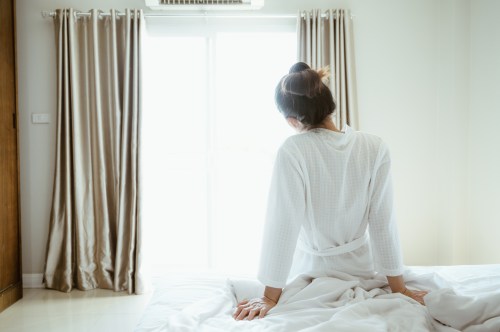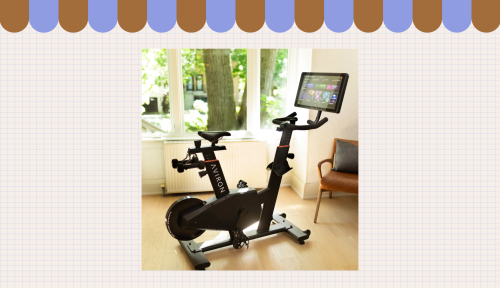It’s no secret that feelings of isolation and loneliness can have some serious side effects on our well-being. Research indicates that a lack of connection to others can correlate to stress, heart disease, and memory loss—to name just a few ailments. But can loneliness cause insomnia or otherwise influence how well we’re able to catch our zzz’s? As it turns out, perhaps: According to a review published last year in Health Psychology Open, there may be a link between social isolation and sleep disturbance, specifically insomnia and sleep quality.
According to Annie Miller, LCSW, a therapist and licensed clinical social worker who specializes in treating insomnia and other sleep disorders, loneliness in itself, though, is likely not what’s causing restlessness. More likely, she says, the root cause is symptoms of depression or anxiety. “Research says that depression can cause sleep problems and that sleep problems can cause depression,” she says. “They’re bi-directional.”
Research has also found that symptoms of depression accelerate feelings of loneliness, and vice versa. So, in a roundabout way, loneliness could cause insomnia and otherwise compromise sleep, but it’s more likely an effect of an underlying mental-health issue that’s leading to restless nights.
“Let’s say you were sleeping better and therefore [feeling fewer symptoms associated with being] depressed—could you tolerate the loneliness better? I think that there’s a cycle.” —Annie Miller, LCSW
“Let’s say you were sleeping better and therefore [feeling fewer symptoms associated with being] depressed—could you tolerate the loneliness better? Would it not feel so bad?” Miller says. “I think that there’s this cycle that you get into that all kind of plays off each other.”
Whether feelings of depression or loneliness can cause insomnia seems to skew toward a “chicken or the egg?” type of dynamic, so if you find yourself both feeling lonely and also barely sleeping, you may be interested in getting tips to turn things around. In this case, keep reading for Miller’s advice for how to get a healthy night’s sleep and perhaps feel less lonely and isolated as a result. And, if you think you may be experiencing symptoms of clinical depression, seeking support from a mental-health professional is a smart move. Together, you can work toward a plan that is right for you and your specific situation.
Can loneliness cause insomnia? Potentially. Here are a sleep pro’s 3 best tips for changing your habits and getting shut-eye
1. Understand the gravity of healthy sleep patterns and behaviors
Miller believes one of the most effective ways to treat insomnia is to audit your sleep habits and, if necessary, adjust the to improve sleep hygiene. If you are feeling lonely and disconnected from others and it’s impacting your sleep, she says a behavioral approach to establish new sleep patterns and practices over time—rather than through aids like ear plugs or a sleep app alone—can be especially helpful. Here are a few suggestions from Miller to help you get started:
- Clock out, literally: Whether it’s an analog clock on your wall or the time on your phone, get rid of your clocks. “It doesn’t help to know what time it is if you can’t sleep,” Miller says. Looking at the time when you can’t sleep can spark feelings of anxiety and perpetuate a sleepless cycle. So, unplug clocks, and keep your phone far away. (You can still have an alarm set, but if it’s connected to a clock, keep it out of sight.
- Use a schedule to build “sleep drive”: Miller has her patients set a strict schedule for going to bed and getting up. But the key is sticking to it—even if you don’t get a full night’s sleep. “Say every night you go to bed at midnight and every morning you get up at 7 a.m., but one night you don’t fall asleep until 3 a.m. You can’t sleep in, you still need to get up at 7 a.m.,” she says. This builds what Miller calls “sleep drive,” aka your body’s need to snooze. Over time, this accumulates until your body adjusts to a steady schedule.
2. Snuggle with your partner… or don’t
If you are feeling particularly lonely, sleeping with a partner can help in some cases, but not all. “Some people are really comforted by the presence of someone else, but I have some patients where this triggers insomnia,” she says.
If you do seem to sleep worse when sharing a bed, Dr. Miller suggests separate sleeping arrangements (Yes, it’s normal and can actually be healthy for a relationship!)
3. Use sleep aids at a minimum
Miller believes treating insomnia should be rooted in behavioral shifts rather than a reliance on products or sleep aids. Yes, you want to sleep in a comfortable sleep environment, and aids like noise machines, ear plugs, fans, and weighted blankets can help—but they should be used sparingly.
“What you want to stay away from is, ‘Okay, I need this to sleep,” she says, because it’s her belief that a reliance on something like melatonin or a special pillow can ultimately cause more problems. Of course, every person is different though, and if some specific tool, aid, or routine helps you sleep (and minimizes feelings of loneliness in the process), keep doing what works for you. And if you’re lost or are seeking approval of your plan, reach out to a trained professional. Connecting with others on your sleep issues can likewise help treat feelings of loneliness or isolation, after all.
Oh hi! You look like someone who loves free workouts, discounts for cult-fave wellness brands, and exclusive Well+Good content. Sign up for Well+, our online community of wellness insiders, and unlock your rewards instantly.
Sign Up for Our Daily Newsletter
Get all the latest in wellness, trends, food, fitness, beauty, and more delivered right to your inbox.
Got it, you've been added to our email list.











